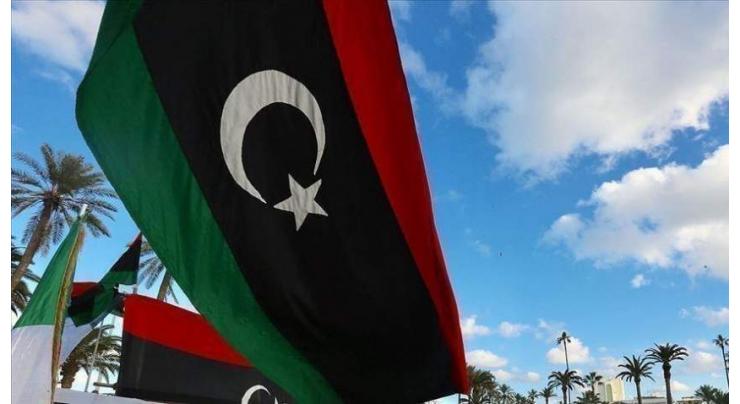
Key Moments In Libya's Peace Process
Mohammad Ali (@ChaudhryMAli88) Published March 15, 2021 | 08:54 PM

A ceasefire between Libya's rival forces last October paved the way for the formation of an interim government to run the country until elections at the end of this year
Tripoli, (APP - UrduPoint / Pakistan Point News - 15th Mar, 2021 ) :A ceasefire between Libya's rival forces last October paved the way for the formation of an interim government to run the country until elections at the end of this year.
Here are key moments in the North African nation's peace process.
- Breakthrough moment - Libya has been in chaos since the 2011 ouster and killing of dictator Moamer Kadhafi in a NATO-backed uprising.
Troops loyal to General Khalifa Haftar in 2019 take control of the country's oil fields before advancing on Tripoli, controlled by the UN-recognised Government of National Accord (GNA), sparking more than a year of fighting.
The rival parties sign a permanent ceasefire with "immediate effect" on October 23, 2020 after five days of discussions organised by the United Nations.
In early November, rival military officers begin talks on home soil for the first time to hammer out a road map for the practical implementation of the ceasefire.
- Oil production resumes - Pro-Haftar forces had blocked oil production and exports in Libya, which sits atop Africa's largest proven crude reserves, since January 2020.
On October 26 Libya's National Oil Corporation announces it is lifting a block on the last paralysed oil field, declaring all petroleum sector installations operational.
- Deal to hold elections - Libyan delegates meeting in Tunisia at UN-supported political talks on November 13 agree to hold national elections at the end of 2021.
Participants in the political dialogue meet in Egypt on January 20 and agree to organise a referendum on the constitution before the elections.
- UN observers arrive - In early February the United Nations deploys an advance team of ceasefire observers.
A group of about 10 UN staff arrives in Triopli in early March to monitor the ceasefire and verify the departure of foreign troops and mercenaries, estimated at 20,000 in early December by the UN.
- Unity govt approved - On February 5, 75 Libyan delegates gather under the auspices of the UN in Switzerland and designate engineer and businessman Abdul Hamid Dbeibah to lead Libya as interim prime minister alongside a three-member presidential council until the December vote.
Haftar pledges his troops will support the peace process, speaking a few days later during a meeting with the head of the presidential council, Mohammad Younes Menfi.
Egypt's President Abdel Fattah al-Sisi meets with Dbeibah in Cairo in mid-February to reaffirm support for the Libyan people.
Air traffic between Benghazi in Libya's east and Misrata in the west resumes for the first time in seven years on March 9.
The following day the parliament approves the unity government in a move hailed by the UN as "a landmark moment in the history of Libya".
Related Topics
Recent Stories

ICC Womens T20 World Cup Qualifier, Match 2: Ireland Women open with Comfortable ..

Robinson, bowlers help New Zealand go 2-1 up against Pakistan

Shahzeb Chachar to hold khuli kachehri on April 26

Heatwave amid Israel's aggression in Gaza brings new misery, disease risk

Tourism must change, mayor says as Venice launches entry fee

Court adjourns Judicial Complex attack case till May 17

Nasreen Noori’s book ‘Popatan Jahra Khwab’ launched

Wafaqi Mohtasib inspection team visits Excise and taxation office

AJLAC announces 5th Conference titled ‘People’s Mandate: Safeguarding Civil ..

Pak-US officials engage to enhance trade, investment ties

IBCC to promote educational excellence, expand regional presence

Pakistani 'Blue Helmets' serving UN Peacekeeping Mission in DR Congo set to leav ..
More Stories From World
-
Slot 'confident' of Liverpool job as 'negotiations' take place
5 hours ago -
Google parent Alphabet's Q1 profits beat estimates: company
6 hours ago -
WADA asks 'independent prosecutor' to examine Chinese swimmers case
6 hours ago -
New York court overturns Harvey Weinstein sex crime conviction
6 hours ago -
Bagnaia and Spanish rivals chase victory at Jerez
7 hours ago -
Russian, Ukrainian strikes kill at least 10 in frontline regions
8 hours ago
-

Heatwave amid Israel's aggression in Gaza brings new misery, disease risk
8 hours ago -

Tourism must change, mayor says as Venice launches entry fee
8 hours ago -

Pakistani 'Blue Helmets' serving UN Peacekeeping Mission in DR Congo set to leave after 20 years of ..
9 hours ago -

Putin says plans to visit China in May
9 hours ago -

US reinstates open internet rules rescinded under Trump
9 hours ago -

Honda announces US$11 bn EV battery and vehicle plant in Canada
9 hours ago





